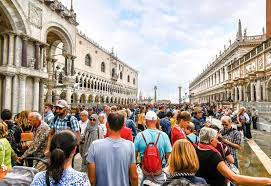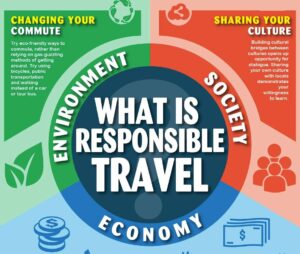A simple guide to Responsible Tourism
“Responsible Tourism” is a term we often come across in recent blogs and articles related to tourism.
What exactly does Responsible tourism mean?
It literally means displaying responsible travel behavior. It refers to actions and strategies that can make commercial tourism sustainable and have a positive impact on Economics, the Environment and the Society.
Tourism is a huge source of foreign currency; even developing countries use this sector for Economic Growth. It is not surprising that until Covid happened, tourism share of global GDP was 10% and above.
The benefits of tourism are obvious, imagine how a poverty ridden country with ample natural resources profits from such exercises!
However when things are not done conscientiously, troubles are bound to follow.
Government policies of certain nations and Social Media’s attractive postcards have made even remotest and sometimes fragile environments look inviting to all. Consequently, mad rush and unfettered growth in the Tourism industry has caused immense damage to tourist spots across the world in many ways.

This sudden spurt has impacted on the resources, economies, environment and lives of locals immensely. Some negative trends that emerged as a result are environmental degradation, uneven development, increased pollution, soil erosion, natural loss of habitat, overcrowding, socio-cultural impacts and destruction of heritage.
The term Responsible Tourism was coined by the year 1996. Consequently, in 2009, a well- deliberate policy was framed in the city of Cape Town to bring a positive change inthis regard. The date November 4th was marked by both the World Travel Market and the United National World Tourism organization as World Responsible Tourism Day
The policy had the following pointers to promote Responsible Tourism:
- “Minimize negative economic, environmental and social impacts.
- Generate greater economic benefits for local people and enhances the well-being of host communities.
- Involve local people in decisions that affect their lives and life chances.
- Improve working conditions and access to the industry.
- Make positive contributions to the conservation of natural and cultural heritage, embracing diversity.
- Provide access for physically challenged people.
- Provide more enjoyable experiences for tourists through more meaningful connections with local people, as well as a greater understanding of local cultural social, and environmental issues.
- Is culturally sensitive, encourages respect between tourists and hosts, and builds local pride and confidence.”
Sustainable tourism Vs. Responsible Tourism
Sustainable tourism is another term used interchangeably with Responsible tourism.
Sustainable tourism encompasses activities of not only the tourist and the tourism service providers but the tourist industry as a whole.
However, responsible tourism alludes to certain actions and measures taken by individuals and business providers to minimize negative effects of tourism. In that sense, Responsible tourism is but a part of Sustainable tourism.
How can you be a Responsible tourist? Some examples…
Here are some ways you can become a responsible tourist..

1. Respect the environment
- Avoid single use plastic
- Reduce, recycle, Reuse what every you carry so that you do not litter
- Watch animals from a distance – do not disturb them
- Avoid feeding birds or animals
- Follow good toilet practices. Carry a portable toilet for human waste. Or at lease ensure that it is discarded 50m away from water sources
- Cook on hard surfaces while camping in the wild or on slopes as vegetation may be injured due to heat
- Stay on the same track during hiking. Don’t create new tracks and cause harm to environment
- Do not introducing alien plants or animals
- Do not throw lighted matches/Cigarettes or bidi butts around
- Do not play loud music inside sensitive environments
- Use facilities provided in tourist spots with diligence
- Recycle paper
- It is best to use Public transport for various reasons. In case you are using your own vehicle than always keep it in good condition and reduce fuel consumption and emission
2. Support the community
- Try being a temporary local instead of a tourist
- Follow the local dress code in places like religious sites, be sensitive to local customs
- Respect the communities’ beliefs and traditions
- Before you visit a tourist spot, try to learn few words of the local language and also make efforts to understand the traditions of the locals, so that when you reach out, the locals feel comfortable with your company.
- Eat local food
- Hire a local guide
- Buy local but avoid buying natural exotic stuff or endangered species which may upset the environment.
How can Businesses be more responsible?
Responsible tourism is not the purview of only the visitors. On their part the host Tourism providers can ensure they pursue few policies and practices in the right direction. The local businesses that are involved in tourism can take the following steps…
- They can support local communities by being culturally tolerant employment etc, cultural tolerance
- Help raise funds for environmental cause
- Take part in regenerative programs carried out by locals
- Employ guides who have trained in sustainable practices and conservation of environment
- Offer an educational element in the services rendered so that your visitors become aware and appreciate local culture as well and geo features
- Grow and serve local food in their food courts or hotels
- Formulate and follow health and safety workplace policy
Here are some special companies who already in this process and have also found a special mention in The Guardian article (year 2019) for their business ethics and giving back to the community…
- Intrepid Travel operators donated 100% of their seasons’ profit to the country of Nepal for rebuilding after the 2015 earthquake. They are among the first carbon-neutral tour operators.
- G2 Adventures involves themselves in Social enterprises and rural tourism development. They supports female-only Chauffeurs India program called Women on Wheels.
- Much Better Adventures ensures a major part of their costs go as an income to the locals. Their Charity Cool earth is another major first in the industry
- Blue yonder, an Indian Company, empowers local weavers and local artisans, reviving traditional handicrafts such as bell metal and providing employment to jobless sand miners.
Kashti Adventures was established with a vision to provide exceptional service and unforgettable experiences in the field of Wilderness Guiding. We rely heavily on the founder team’s multitude experiences and commitment to Responsible travel and true sustainability.
We aim to “leave no trace” through the following initiatives…
- We set camp only on durable surfaces during our treks
- We encourage our group to dispose waste appropriately
- We ensure our group stays on trails – so that new tracks, that may damage the environment, are not created nor is wildlife disturbed.
- We employ locals for supporting us during our treks
- We also endeavor to bring awareness in our clientele of the local culture and traditions through our programs like Village tours. Our recent one was in Parvati valley
- We are collaborating with schools too to make them aware of what merits earth has bestowed on them and how they can carry them forward intact!
- Some of our proceeds go to underprivileged kids who travel harsh terrain to complete their education.
- Food for our guests are ordered locally and this to our benefit in 2 way – (i) Our guests get to try out unique local flavors and (ii)the locals are immensely supported by the economics of this initiative.
We have more initiatives and activities lined up in the coming months and wish you can join us in this enterprise. Check out our website and pick up the treks of your choice today.
Blog by Kalpana
Quick Links
Information
Contact Info
- Bhuntar, Kullu
- Dwarka, New Delhi
- +91 9971355865
- info@kashtiadventures.com
In a Nut shell
Certified by MSME, Govt. of India, we are a 5 star rating company making golden efforts to beautify travellers experience.
Kashti Adventures. Developed By Digital webster
Copyright © 2021. All rights reserved.
Book my trip
